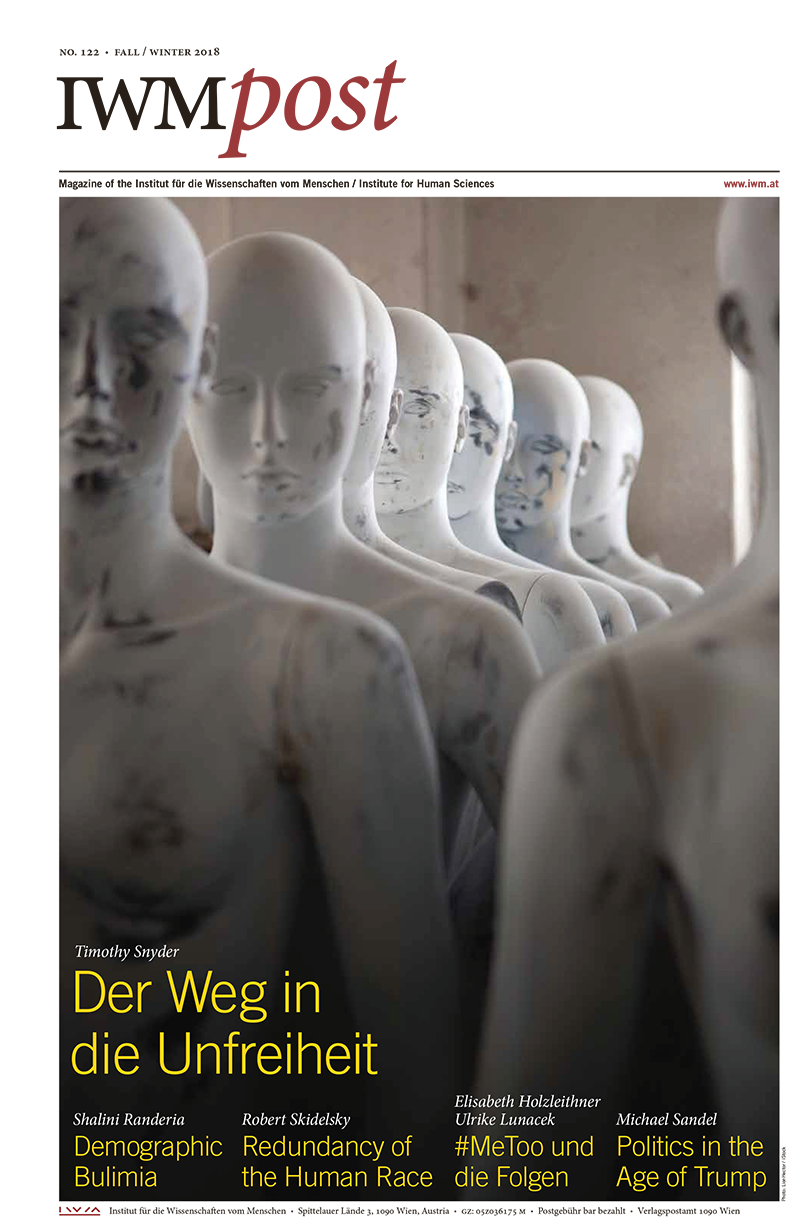Power and powerlessness—this was not only the theme of this year’s Vienna Humanities Festival, conflict-laden power relations also run like a red thread through the current issue of the IWMpost. As Timothy Snyder shows in his latest book The Road to Unfreedom, democracy can very quickly turn into tyranny. Michael Sandel describes this very vividly using Donald Trump’s example in the USA. This is also where the #MeToo debate, with which Elisabeth Holzleithner and Ulrike Lunacek critically deal, began. Ruth Wodak, on the other hand, asks about the position of women in the “postfactual age”. John Palattella has analyzed how media deal with declining sales figures and loss of credibility.
The challenges currently facing the EU are the subject of several articles. While David Goodhart criticizes the growing social divide between the so-called Somewheres and Anywheres, Anthony Barnett sees regulation at the heart of the EU’s achievement.
The fellows of the project Europe’s Futures have answered the question which strategies are necessary to lead Europe out of the crisis into a hopeful future from different perspectives. From an economic point of view, Lord Robert Skidelsky’s essay explores the question whether people will sooner or later become redundant in the age of digitalization and automation of work. Shalini Randeria’s text on “demographic bulimia”, which contrasts the low birth rates of many Western societies with the “overpopulation” in the Global South, deals with another topic of global relevance. Tobias Bernet, on the other hand, shows in his contribution that conflicts over housing are symptomatic of the socio-ppolitical divisions of the present. Sergey Chapnin examines the extent to which the growing in uence of the Orthodox Church in Russia can be seen as triumph or tragedy.
A legal focus of this issue deals with the deniers of international law in geopolitical competition (Paul Hahnenkamp) and the precarious situation of the Rohingyas as the world’s largest stateless population (Ranabir Samaddar). In an interview with Tatiana Urdaneta Wittek, Miloš Vec has examined in more detail the role Austria can play in clarifying the most serious human rights violations in Syria.
Anita Dick
Marion Gollner
Download the IWMpost 122 as a PDF
Contents
Vienna Humanities Festival 2018
Der Weg in die Unfreiheit / von Timothy Snyder
Macht und Ohnmacht / Vienna Humanities Festival
Signal or Noise? Power and Powerlessness in the Media / by John Palattella
Women’s Empowerment
Sexuelle Belästigung: Das letzte Tabu? / von Ulrike Lunacek und Elisabeth Holzleithner
„Geht’s den Frauen gut, geht’s uns allen gut!“ / von Ruth Wodak
Europe’s Futures
Visions of Europe
The EU is a Union of Regulation / by Anthony Barnett
Democracy in Question
The 3 Hs and the Achievement Society / by David Goodhart
Is Democracy in Peril? Politics in the Age of Trump / by Michael J. Sandel
Politische Salons
Conflicting Realities
Demographic Bulimia / by Shalini Randeria
Landlords versus Commoners: Housing Conflicts and Political Divides / by Tobias Bernet
Jan Patočka Memorial Lecture 2018
Will the Population become Redundant? / by Robert Skidelsky
Scales of Justice
Fight Fire with Fire: Leugnung und Normativität im Völkerrecht / von Paul Hahnenkamp
Späte Gerechtigkeit für syrische Folteropfer? / Miloš Vec im Gespräch mit Tatiana Urdaneta Wittek
The Rohingya: A Stateless Population / by Ranabir Samaddar
Politics of Commemoration
The Momentous ‘Eight’ in Czecho-Slovak History / by Jacques Rupnik
Religion in Russia
The Revival of the Orthodox Church in Russia: Triumph or Crisis? / by Sergey Chapnin
Neue Publikationsreihe
Impressum
Editors: Marion Gollner, Anita Dick
Editorial Assistance: Simon Garnett, Christina Pössel, Kate Younger.
Design: steinkellner/zotter, www.steinkellner.com
Printed by Grasl FairPrint, 2540 Bad Vöslau.
IWMpost is published two times a year.
Current circulation: 68,000
